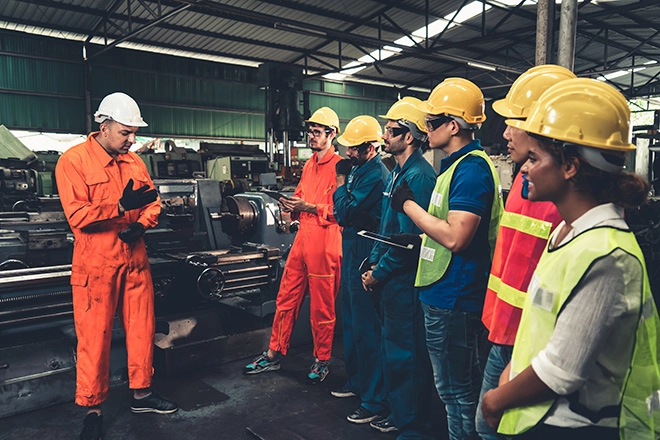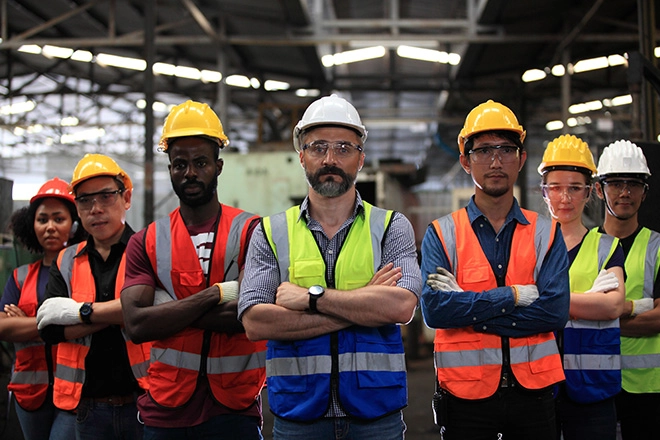What is an MES and how does it help optimize factory operations?
MES stands for Manufacturing Execution System. It's a software application that automates the manufacturing process, from order entry to shipping. The main purpose of an MES is to manage inventory levels and help you make better decisions about production scheduling, job costing and quality control.
MES can support all types of processes within your factory--from simple assembly lines to complex multi-part manufacturing jobs--and they offer many benefits over manual systems:
- Reduced cycle times and inventory levels.
- Improved quality control and reduced waste.
- Systematic data collection for analysis and reporting purposes.
- Automated job tracking, which helps reduce errors and increase productivity.
- Reduced labor costs.
How does machine learning play a role in MES?
Machine learning is a type of artificial intelligence that enables computers to learn from experience. In manufacturing, machine learning allows MES systems to analyze data from past production runs and make predictions about future events, such as when a machine will break down or when a product is likely to fail.
Machine learning can also be used by MESs in conjunction with other decision support tools (such as predictive maintenance) to predict which machines are likely to be most efficient at any given time. For example, if you have five identical robotic arms all performing identical tasks on the same line but one of them has been having frequent errors lately and another has been working perfectly fine since it was installed last year--machine learning can help determine which one needs replacing before it causes quality issues down the line!

Improve Quality Management with AI Generated Reports
What are some ways AI can optimize factory operations?
AI can help optimize factory operations by helping to predict and prevent downtime, reducing the time it takes to find the root cause of an issue. In addition, AI is able to optimize production processes so that manufacturers are able to increase productivity and reduce costs. Finally, AI can help improve product quality by ensuring only high-quality products reach consumers.
AI can also help manufacturers improve their supply chain. This is especially important for companies that deal with high-tech components or customized products, where a single component failure can cause the entire system to fail. With AI, manufacturers are able to predict when they will run out of certain materials and parts, allowing them to take steps before any issues arise.
AI can also help reduce the amount of waste that is generated in factories. This is especially important for companies that manufacture products with high-tech components or customized products, where a single component failure can cause the entire system to fail. With AI, manufacturers are able to predict when they will run out of certain materials and parts, allowing them to take steps before any issues arise.
How do MES and AI work together to transform the factory of the future?
MES and AI are two powerful technologies that can be used together to transform the factory of the future. MES provides data and insights to AI, which then uses this information to make decisions in real-time. This allows you to improve efficiency and quality while reducing costs by automating manual tasks and streamlining processes.
MES systems are designed for manufacturing environments where there are multiple machines producing products at different rates or volumes, with each machine having its own parameters that need to be monitored for optimal performance. By collecting information about these parameters over time, you're able to identify patterns between them so you know when there's an issue with one of your machines before it becomes an issue with all of them.
For example: if one machine is running too hot because it hasn't been cleaned recently (a condition known as "choking"), then another machine might start suffering from similar problems after being exposed too long without cleaning itself out too (also called "choking").
What's next in the evolution of MES technology and AI-driven decisions?
As MES technology continues to evolve, the integration of artificial intelligence (AI) and machine learning (ML) will play a pivotal role in driving decision-making processes to new heights. AI-driven decisions will enable MES platforms to analyze vast amounts of data in real-time, identify patterns, predict outcomes, and provide actionable insights to optimize manufacturing operations further.
The advent of AI-powered predictive analytics will revolutionize proactive maintenance strategies, allowing manufacturers to anticipate equipment failures before they occur and schedule preventive maintenance tasks accordingly. This predictive capability will not only minimize unplanned downtime but also extend the lifespan of critical assets, resulting in significant cost savings and improved overall equipment effectiveness (OEE).
AI-driven decisions will empower manufacturers to enhance supply chain visibility and responsiveness by optimizing inventory levels, anticipating demand fluctuations, and mitigating supply chain disruptions. By leveraging AI-driven insights, manufacturers can make informed decisions regarding inventory management, procurement, and production scheduling, thereby minimizing inventory carrying costs and maximizing operational efficiency.
Overall, the integration of AI-driven decisions into MES technology represents the next frontier in manufacturing optimization, unlocking new opportunities for efficiency, productivity, and competitiveness. As manufacturers continue to embrace digital transformation and harness the power of AI, MES platforms will play an increasingly critical role in driving smarter, more agile, and more resilient manufacturing operations.
Support for Lean Manufacturing Principles
Support for Lean Manufacturing Principles is a key feature of modern Manufacturing Execution Systems (MES) platforms. These platforms are designed to facilitate the implementation and execution of lean manufacturing methodologies, which focus on minimizing waste, improving efficiency, and maximizing value for customers. MES platforms provide a range of tools and functionalities that support lean principles, helping manufacturers streamline processes, reduce cycle times, and enhance productivity.
One way MES platforms support lean manufacturing is by providing real-time visibility into production processes and performance metrics. By collecting data from sensors, machines, and manual inputs, MES platforms enable manufacturers to monitor key performance indicators (KPIs) such as cycle time, throughput, and machine utilization in real-time. This visibility allows manufacturers to identify bottlenecks, inefficiencies, and areas for improvement, empowering them to make data-driven decisions to optimize production flows and eliminate waste.
MES platforms offer features such as electronic work instructions, standardized operating procedures, and visual work instructions that support standardization and consistency in manufacturing processes. By providing workers with clear instructions and guidelines, MES platforms help ensure that tasks are performed correctly and efficiently, reducing the risk of errors, defects, and rework. This adherence to standardized processes is a fundamental aspect of lean manufacturing, enabling manufacturers to achieve higher levels of quality and reliability in their products.
MES platforms support continuous improvement initiatives by enabling manufacturers to capture, analyze, and act upon performance data over time. By leveraging historical data and analytics capabilities, MES platforms facilitate root cause analysis, trend identification, and process optimization, driving incremental improvements in manufacturing operations. This iterative approach to improvement aligns with the principles of lean manufacturing, which emphasize ongoing efforts to eliminate waste and enhance value for customers.

Increased Quality with Smart MES
Support for Lean Manufacturing Principles
Support for Lean Manufacturing Principles is a key feature of modern Manufacturing Execution Systems (MES) platforms. These platforms are designed to facilitate the implementation and execution of lean manufacturing methodologies, which focus on minimizing waste, improving efficiency, and maximizing value for customers. MES platforms provide a range of tools and functionalities that support lean principles, helping manufacturers streamline processes, reduce cycle times, and enhance productivity.
One way MES platforms support lean manufacturing is by providing real-time visibility into production processes and performance metrics. By collecting data from sensors, machines, and manual inputs, MES platforms enable manufacturers to monitor key performance indicators (KPIs) such as cycle time, throughput, and machine utilization in real-time. This visibility allows manufacturers to identify bottlenecks, inefficiencies, and areas for improvement, empowering them to make data-driven decisions to optimize production flows and eliminate waste.
MES platforms offer features such as electronic work instructions, standardized operating procedures, and visual work instructions that support standardization and consistency in manufacturing processes. By providing workers with clear instructions and guidelines, MES platforms help ensure that tasks are performed correctly and efficiently, reducing the risk of errors, defects, and rework. This adherence to standardized processes is a fundamental aspect of lean manufacturing, enabling manufacturers to achieve higher levels of quality and reliability in their products.
MES platforms support continuous improvement initiatives by enabling manufacturers to capture, analyze, and act upon performance data over time. By leveraging historical data and analytics capabilities, MES platforms facilitate root cause analysis, trend identification, and process optimization, driving incremental improvements in manufacturing operations. This iterative approach to improvement aligns with the principles of lean manufacturing, which emphasize ongoing efforts to eliminate waste and enhance value for customers.
Conclusion
With the rise of machine learning and AI, manufacturers can now make more informed decisions about how to optimize their factory operations. This means better quality control, cost savings and increased productivity across the board--and with less human intervention. With these technologies at our disposal, it's time for you to start thinking about how they can help transform your facility into a truly smart factory that operates on its own accord.












